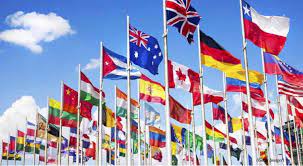Challenging Rules-based International Order: New Discourse of China Threat Theory

By Sen Lu, Jinglin Xiao and Yuchun Song
On May 2nd, 2021, by the end of first 100 days of Biden administration, CBS interviewed the U.S. Secretary of State Anthony Blinken on 60 Minutes. In this programme, Blinken pointed out that China was acting more repressively at home and more aggressively abroad to challenge rules-based international order, then attributed the responsibility of deterioration of US-China relationship to China. In addition, he claimed China was implementing “genocide” policy on Uyghur people and taking on confronting attitude to compete with western power unfairly.
These claims and baseless accusations were made to show China is destructing original rules-based international order, which U.S. is upholding. For a time, “China Challenging Rules-based International Order” become a new discourse in headlines of different media reports with global reach that also tried to stir up uproar.
Actually, this discourse had surfaced long ago, so let’s roll back some time. On August 25th, 2020, the National Bureau of Asian Research published No. 87 special report compiled by Nadège Rolland, An Emerging China-centric Order: China’s Vision for a New World Order in Practice. This report claimed China is restructuring and redefining current international system elements to accommodate its recognition and interests. It’s worth noting that U.S. deems China as “order challenger” in its official report for the first time. To demonstrate this kind of discourse, western presses always take South China Sea disputes, “forced labor” and “genocide” of Uyghurs, “undermining” Hong Kong’s autonomy as examples. On March 8th, 2021, Le Monde criticized China’s sovereignty claims in South China Sea violating United Nations Convention on the Law of the Sea, while alleged China’s construction of artificial islands and military bases in this area is forcing other relating countries to waive their legal rights.
International order refers to the international rules of conduct and corresponding safeguard mechanisms formed on the basis of a certain world structure, usually including international laws, international agreements, international conventions, international rules, international mechanisms and international organizations, etc., emphasizing the order of the international society. What the United States calls a “rule-based international order” is substantially U.S. led liberal international order. This kind of international order is constituted of western based international institutions and international laws as its framework, and representative democracy, free market economy, liberal ideologies (liberty, democracy, human rights, etc.) as its benchmark. The “Order Challenger” discourse implies China is deviating from western liberal international order and tries to overturn it finally to establish China-centric international order satisfying China’s interests, just because the growing economic and military capability of China makes it the only country in the world that can do so. Like “Clash of Civilizations” theory, “Order Challenger” theory still a misleading discourse promotes stereotypes depicting China as an outlaw of international society undermining global interests.
“Order Challenger” discourse is articulated as the latest version of “China Threat” theory by U.S. led western countries. The U.S. acts vigilantly as China strengthening its power and expanding its influence may damage leading position of western world especially the U.S. itself as a superpower. To maintain the hegemony of the U.S., it’s trying to make use of hegemonic verbal ability to stigmatize China’s international image, which usually is seen as a confinement measure for China’s rise. In such kind of stigmatization, China has been described as “volatile”, “Evil China”, describing “China’s rise” as a “Challenge to the international order”, exaggerating “China’s violation of US rules” as “China’s violation of international rules”, and China as “A destabilizing factor in the world”, and now “order challenger” may intimidate the rest of the world so that other countries fear and worry about China’s rise, in order to unite other countries to oppose or contain China. As on April 13th, 2021, NATO Secretary Jens Stoltenberg spoke in India, he called for engaging even more closely with friends and partners around the world, because that is the best way to protect the rules-based international order and cope with the “challenger”. However, rumors bound to be debunked by truth. The majority of international society expressed determined support for China, who wouldn’t be fooled by some tricks.
As now, distributing Sinophobia sentiment and stigmatizing China won’t help deescalating U.S.-China contradiction. Equality and respect, not confrontation, are the only keys for this conundrum. The U.S. should treat China’s rise rationally and go back to negotiation and dialogue as soon as possible.
(Sen Lu, Jinglin Xiao and Yuchun Song are scholars at Yunnan University)
Recent News

Do not make expressions casting dout on election: EC
14 Apr, 2022
CM Bhatta says may New Year 2079 BS inspire positive thinking
14 Apr, 2022
Three new cases, 44 recoveries in 24 hours
14 Apr, 2022
689 climbers of 84 teams so far acquire permits for climbing various peaks this spring season
14 Apr, 2022
How the rising cost of living crisis is impacting Nepal
14 Apr, 2022
US military confirms an interstellar meteor collided with Earth
14 Apr, 2022
Valneva Covid vaccine approved for use in UK
14 Apr, 2022
Chair Prachanda highlights need of unity among Maoist, Communist forces
14 Apr, 2022
Ranbir Kapoor and Alia Bhatt: Bollywood toasts star couple on wedding
14 Apr, 2022
President Bhandari confers decorations (Photo Feature)
14 Apr, 2022










